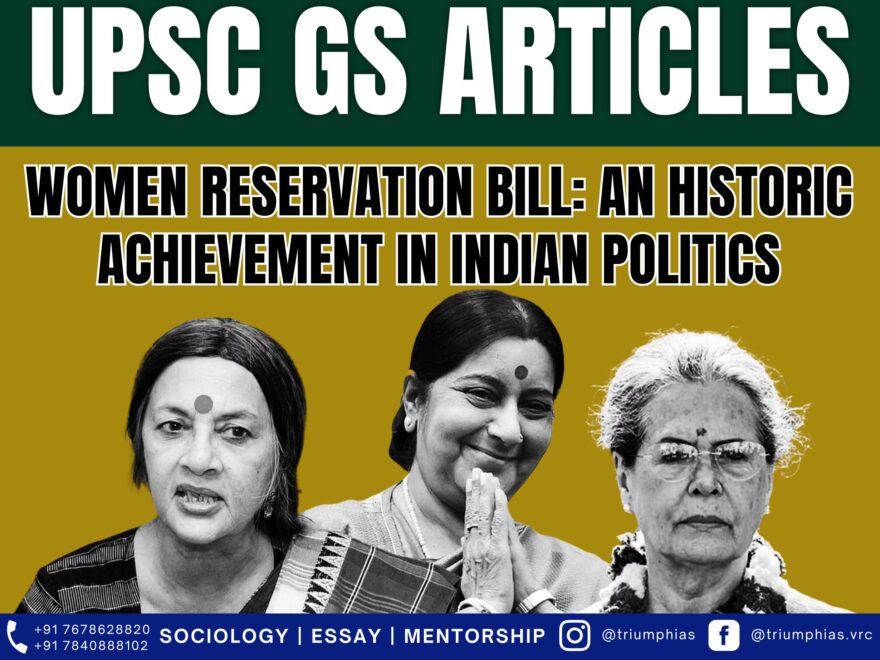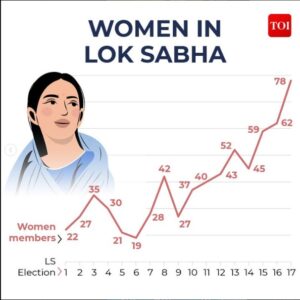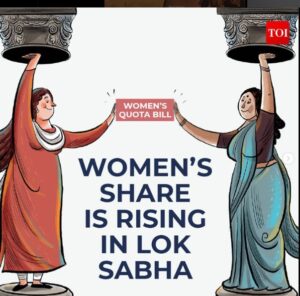Women Reservation Bill: An historic achievement
(Relevant for General Studies | Polity |Paper Prelims/Mains)
Women Reservation Bill: An historic achievement
The Constitution (One Hundred and Twenty-Eighth Amendment) Bill, 2023, has received unanimous approval in both Lok Sabha and Rajya Sabha. This bill aims to allocate one-third of the total seats in the Lok Sabha and state legislative assemblies for women.
Key features of the Bill
- Women’s Reservation: This legislation proposes to reserve approximately one-third of all seats for women in the Lok Sabha, state legislative assemblies, and the Legislative Assembly of the National Capital Territory of Delhi. This reservation also extends to seats designated for SCs and STs in the Lok Sabha and state legislatures.
- Implementation of Reservation: The reservation will come into effect following the publication of the census conducted after the enactment of this Bill. Subsequently, seat allocation for women will be determined through the delimitation process. This reservation will remain in effect for a period of 15 years, although it may continue beyond this duration as determined by a law enacted by Parliament.
- Seat Rotation: Seats reserved for women will be subject to rotation after each delimitation, in accordance with legislation passed by Parliament.
Background of Women’s Reservation in Politics
- Historical Background of Women’s Reservation in Politics: The roots of the issue of reserving political seats for women in India can be traced back to the Indian national movement. In 1931, prominent leaders Begum Shah Nawaz and Sarojini Naidu jointly submitted an official memorandum to the British Prime Minister, addressing the status of women in the new Constitution.
- Recommendations Leading to Constitutional Amendments: The National Perspective Plan for Women, put forth in 1988, recommended the implementation of reservations for women, starting from the grassroots level of panchayats to the highest levels of Parliament. These recommendations paved the way for the significant 73rd and 74th amendments to the Constitution, which mandated that all State governments reserve one-third of seats in Panchayati Raj Institutions for women, along with one-third of chairperson positions at all levels of these institutions. Similar provisions were extended to urban local bodies as well, with one-third of seats being reserved for Scheduled Caste/Scheduled Tribe women within these allocations.
- National Policy for Women Empowerment: In 2001, the National Policy for the Empowerment of Women stated the intention to consider reservations for women in higher legislative bodies.
- Committee Recommendations: In May 2013, the Ministry of Women and Child Development established a committee to assess the status of women, which recommended ensuring a minimum of 50% reservation for women in various levels of governance, including local bodies, State Legislative Assemblies, Parliament, ministerial positions, and all government decision-making bodies.
- Report on Women’s Status in India: In 2015, the Report on the Status of Women in India highlighted the persistently low representation of women in state assemblies and Parliament. It advocated for reserving a minimum of 50% of seats for women in local bodies, state legislative assemblies, Parliament, ministerial roles, and all government decision-making bodies
Arguments for the Bill
- Promoting Gender Equality: Enhancing women’s representation in politics is a crucial stride toward achieving gender equality.
- Global Gender Gap Report 2022 reveals that India is positioned 48th out of 146 countries in Political Empowerment. However, India’s score of 0.267 remains relatively low compared to leading countries in this category. For example, Iceland, securing the top rank, boasts a score of 0.874, while Bangladesh stands at 9th place with a score of 0.546.
- Addressing Historical Underrepresentation: While there has been an increase in the number of women Members of Parliament (MPs), rising from 5% in the first Lok Sabha to 15% in the 17th Lok Sabha, this figure remains considerably low.
- Research conducted in 2003 regarding the impact of women’s reservation in panchayats demonstrated that women elected through this policy focus more on public goods closely associated with women’s concerns.
- The Standing Committee on Personnel, Public Grievances, Law, and Justice (2009) acknowledged that reserving seats for women in local bodies has enabled them to make significant contributions.
- Ensuring Women’s Right to Representation and Self-Determination: If a particular group is not adequately represented within the political system, its capacity to influence policymaking is restricted. The Convention on the Elimination of All Forms of Discrimination Against Women mandates the elimination of discrimination in political and public spheres.
- Numerous surveys indicate that women representatives from Panchayati Raj have made commendable contributions to the development and overall well-being of rural society. Many of them aspire to work on a larger scale; however, they encounter various challenges within the prevailing political structure.
- Embracing Diverse Perspectives: A more diverse legislature that includes a substantial number of women can inject a wider array of perspectives into the decision-making process. This diversity has the potential to result in more effective policy formulation and governance.
- Empowering Women: Women’s reservation in politics empowers women on multiple fronts. It not only encourages increased female participation in politics but also serves as an inspiration for women to assume leadership roles across various sectors.
- Advocating for Women’s Issues: Female politicians frequently prioritize and champion issues directly impacting women, such as gender-based violence, women’s healthcare, education, and economic empowerment. Their presence can catalyze the prioritization of these matters in policy discourse.
- Providing Role Models: Women leaders in politics can serve as role models for young girls, motivating them to aspire to leadership positions in diverse fields. Political representation shatters stereotypes and fosters inspiration for future generations.
- Pioneering Women Leaders: Indira Gandhi served as India’s inaugural and sole female Prime Minister from 1966 to 1977. Sushma Swaraj became India’s second woman External Affairs Minister after Indira Gandhi.
Arguments against the Bill
- Diversity Among Women: It’s important to acknowledge that women form a diverse group, unlike a homogeneous community such as a caste. Consequently, the same arguments used to advocate for reservations based on caste cannot be directly applied to women.
- Opposition to Women’s Reservations: There exists opposition to the idea of reserving seats for women, with some asserting that it contravenes the Constitution’s assurance of equality. Critics argue that implementing reservations might undermine the principle of merit-based competition among women, potentially affecting their societal standing.
Challenges regarding Implementation of this Bill
- Challenges Related to Delimitation: The implementation of the reservation will be contingent on the completion of the delimitation process, which, in turn, hinges on the release of the pertinent data from the forthcoming census. Unfortunately, the timing of the upcoming census remains uncertain, adding another layer of ambiguity to the delimitation process.
- OBC Concerns Regarding the Bill: The women’s reservation bill, which allocates 33% of seats for women in the Lok Sabha and state assemblies, does not include a provision for reserving seats specifically for women from the OBC (Other Backward Classes) category. The Geeta Mukherjee Committee in 1996 recommended extending the scope of women’s reservation to include OBC women as well.
Effective implementation of this bill depends on
- Enhancing Independent Decision-Making: Establishing an autonomous monitoring system or committees that explicitly prohibit the interference of family members in the decision-making processes of female representatives is crucial. This can be achieved by diminishing the influence of patriarchal attitudes.
- Promoting Awareness and Education: Raising awareness among women regarding their rights and the significance of their engagement in politics is vital. Educational programs and awareness campaigns can play a pivotal role in bolstering women’s political participation.
- Combating Gender-Based Violence and Harassment: Gender-based violence and harassment pose significant impediments to women’s involvement in politics. Addressing these issues through policy and legal measures can create a safer and more supportive political environment for women.
- Electoral Process Reforms: Introducing reforms such as proportional representation and preferential voting systems can bolster women’s representation in politics by ensuring a higher number of women are elected to office.
- These are just a few strategies aimed at increasing the presence of women in Indian politics. To effect enduring change, a comprehensive approach that tackles multiple challenges is imperative.
Reference The Hindu
Frequently Asked Questions:
1. Question: What is the significance of the Constitution (One Hundred and Twenty-Eighth Amendment) Bill, 2023, in the context of women’s representation in Indian politics?
Answer: The bill aims to reserve one-third of seats in the Lok Sabha and state legislative assemblies for women, promoting gender equality and empowering women in politics.
2. Question: How does the Geeta Mukherjee Committee’s recommendation relate to the women’s reservation bill in India?
Answer: The Geeta Mukherjee Committee recommended extending women’s reservation to include OBC women, a provision not included in the current bill.
3. Question: What are the key arguments in favor of women’s reservation in politics, and how does it impact policy formulation and governance?
Answer: Women’s reservation promotes gender equality, diverse perspectives, and empowers women, leading to more effective policy formulation and prioritization of women’s issues.
4. Question: What challenges are associated with the implementation of the women’s reservation bill, particularly concerning delimitation and OBC concerns?
Answer: The bill’s implementation is contingent on delimitation, which depends on census data, and it does not address OBC women’s representation, posing challenges to its effectiveness.
5. Question: What strategies can be employed to enhance women’s participation in Indian politics and overcome gender-based barriers?
Answer: Strategies include independent decision-making, awareness and education, combating gender-based violence, and electoral process reforms to increase women’s representation.
GS Related Practices Questions…
To master these intricacies and fare well in the Sociology Optional Syllabus, aspiring sociologists might benefit from guidance by the Best Sociology Optional Teacher and participation in the Best Sociology Optional Coaching. These avenues provide comprehensive assistance, ensuring a solid understanding of sociology’s diverse methodologies and techniques.
Women Reservation Bill, Indian politics, gender equality, political empowerment, reservations, diversity, challenges, implementation, strategies, Constitution Amendment, historic achievement, Women Reservation Bill, Indian politics, gender equality, political empowerment, reservations, diversity, challenges, implementation, strategies, Constitution Amendment, historic achievement.

Why Vikash Ranjan’s Classes for Sociology?
Proper guidance and assistance are required to learn the skill of interlinking current happenings with the conventional topics. VIKASH RANJAN SIR at TRIUMPH IAS guides students according to the Recent Trends of UPSC, making him the Best Sociology Teacher for Sociology Optional UPSC.
At Triumph IAS, the Best Sociology Optional Coaching platform, we not only provide the best study material and applied classes for Sociology for IAS but also conduct regular assignments and class tests to assess candidates’ writing skills and understanding of the subject.
Choose The Best Sociology Optional Teacher for IAS Preparation?
At the beginning of the journey for Civil Services Examination preparation, many students face a pivotal decision – selecting their optional subject. Questions such as “which optional subject is the best?” and “which optional subject is the most scoring?” frequently come to mind. Choosing the right optional subject, like choosing the best sociology optional teacher, is a subjective yet vital step that requires a thoughtful decision based on facts. A misstep in this crucial decision can indeed prove disastrous.
Ever since the exam pattern was revamped in 2013, the UPSC has eliminated the need for a second optional subject. Now, candidates have to choose only one optional subject for the UPSC Mains, which has two papers of 250 marks each. One of the compelling choices for many has been the sociology optional. However, it’s strongly advised to decide on your optional subject for mains well ahead of time to get sufficient time to complete the syllabus. After all, most students score similarly in General Studies Papers; it’s the score in the optional subject & essay that contributes significantly to the final selection.
“A sound strategy does not rely solely on the popular
Opinion of toppers or famous YouTubers cum teachers.”
It requires understanding one’s ability, interest, and the relevance of the subject, not just for the exam but also for life in general. Hence, when selecting the best sociology teacher, one must consider the usefulness of sociology optional coaching in General Studies, Essay, and Personality Test.
The choice of the optional subject should be based on objective criteria, such as the nature, scope, and size of the syllabus, uniformity and stability in the question pattern, relevance of the syllabic content in daily life in society, and the availability of study material and guidance. For example, choosing the best sociology optional coaching can ensure access to top-quality study materials and experienced teachers. Always remember, the approach of the UPSC optional subject differs from your academic studies of subjects. Therefore, before settling for sociology optional, you need to analyze the syllabus, previous years’ pattern, subject requirements (be it ideal, visionary, numerical, conceptual theoretical), and your comfort level with the subject.
This decision marks a critical point in your UPSC – CSE journey, potentially determining your success in a career in IAS/Civil Services. Therefore, it’s crucial to choose wisely, whether it’s the optional subject or the best sociology optional teacher. Always base your decision on accurate facts, and never let your emotional biases guide your choices. After all, the search for the best sociology optional coaching is about finding the perfect fit for your unique academic needs and aspirations.
To master these intricacies and fare well in the Sociology Optional Syllabus, aspiring sociologists might benefit from guidance by the Best Sociology Optional Teacher and participation in the Best Sociology Optional Coaching. These avenues provide comprehensive assistance, ensuring a solid understanding of sociology’s diverse methodologies and techniques. Sociology, Social theory, Best Sociology Optional Teacher, Best Sociology Optional Coaching, Sociology Optional Syllabus.
Best Sociology Optional Teacher, Sociology Syllabus, Sociology Optional, Sociology Optional Coaching, Best Sociology Optional Coaching, Best Sociology Teacher, Sociology Course, Sociology Teacher, Sociology Foundation, Sociology Foundation Course, Sociology Optional UPSC, Sociology for IAS,
Follow us :


https://t.me/VikashRanjanSociology
Find More Blogs
|
Scope of the subject and comparison with other social sciences |
|||
|
|
|
|
Modernity and social changes in Europe |



